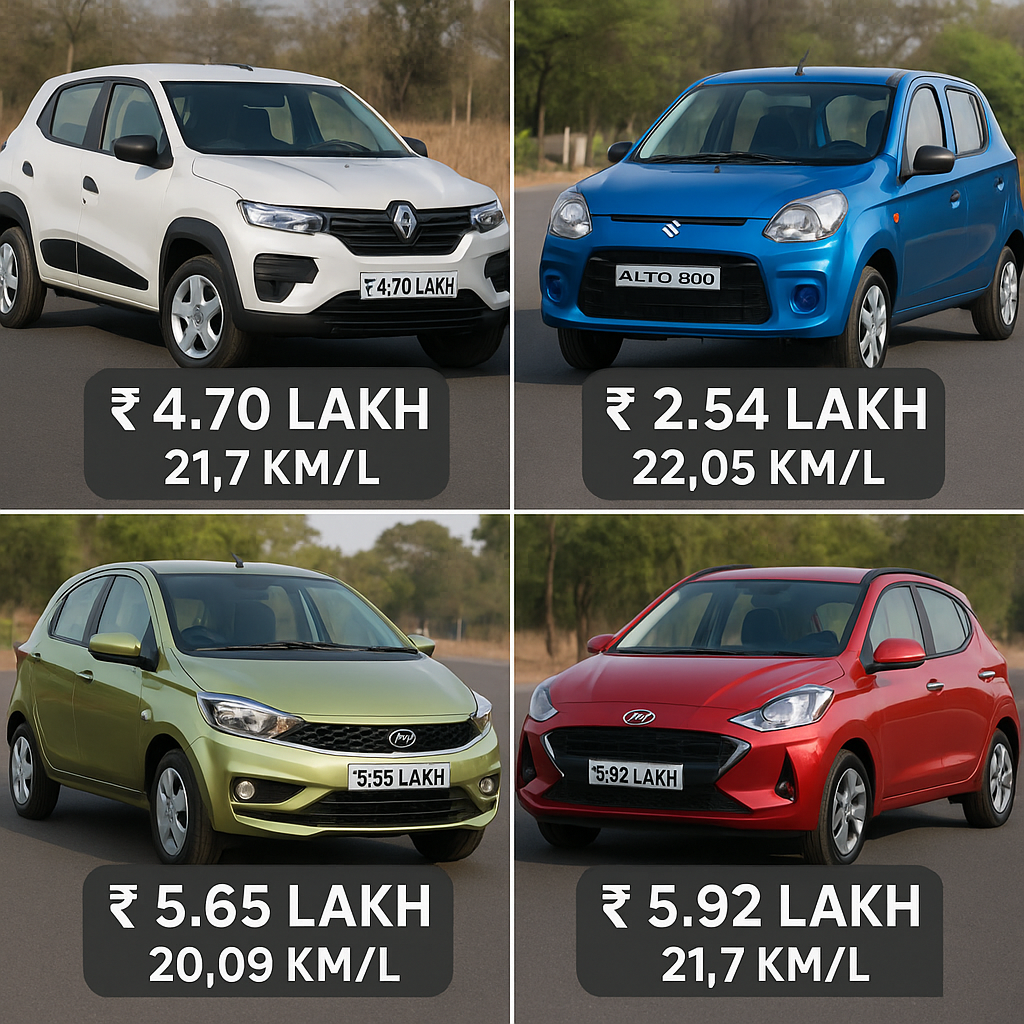The Indian automotive sector is experiencing a notable downturn during what should be a preparation period for the festive season. With retail vehicle sales declining 4.31% year-over-year in July 2025, the industry faces an unexpected challenge that extends beyond typical seasonal fluctuations. A critical factor emerging from recent market analysis suggests that consumer anticipation of potential GST reductions on automobiles may be contributing significantly to this slowdown.
Current State of the Market
The Indian passenger vehicle market has shown mixed signals throughout 2025. While July saw a modest 1.1% year-over-year growth in car sales, the broader trend reveals concerning patterns. Car wholesales hit an 18-month low in June 2025, dropping 7.4% to 312,849 units, marking the industry’s weakest performance since late 2023.
Major manufacturers have felt the impact differently:
- Maruti Suzuki reported a 13% decline in domestic dispatches in June
- Hyundai experienced a 12% drop in the same period
- Tata Motors saw a 6.0% decrease in July sales
- Mahindra bucked the trend with a strong 16.4% increase
The small car segment has been particularly affected, with mini-segment vehicles like the Alto and S-Presso falling from 9,395 units to 6,414 units. This decline is especially concerning given India’s 6.5% GDP growth, highlighting what industry experts describe as an “affordability crisis”.
The GST Reduction Factor
A significant development shaping current market dynamics is the proposed GST reduction on automobiles from 28% to 18%. This potential tax reform, part of broader economic reforms aimed at simplifying India’s tax structure, has created an unintended consequence: purchase deferrals by price-sensitive consumers.
Venkatram Mamillapalle, Managing Director and CEO of Renault India, directly attributed current sales impacts to GST speculation: “Everybody’s anticipation is that if GST goes down, the value of the car will also go down. So those people who can wait, they are waiting”. This sentiment reflects a broader consumer psychology where potential buyers are postponing purchases in anticipation of price reductions of up to 10% for small cars.
Industry Response and Urgency
The Federation of Automobile Dealers Associations (FADA) has expressed concern about the timing, stating that “the proposed low rates of GST on small cars should be implemented before Diwali and the pent-up demand will only materialise during the festive period after the new GST rollout”. This timing issue creates a double challenge: current sales suffer from anticipation, while the crucial festive season window may be missed if implementation delays persist.
Impact on Different Market Segments
Mass Market Winners
The proposed GST reduction particularly benefits mass-market OEMs such as Maruti, Hyundai, Tata, Honda, Toyota, and Mahindra. These manufacturers dominate the entry-level and mid-size segments where price sensitivity is highest, making them prime beneficiaries of reduced acquisition costs.
Compact SUV Momentum
Compact SUVs are expected to witness the biggest sales boost from GST reduction. Popular models under 4 meters with sub-1200cc petrol engines—including the Tata Nexon, Hyundai Venue, Kia Sonet, and Mahindra XUV 3XO—qualify for the revised bracket, potentially accelerating India’s ongoing SUV-ization trend.
Electric Vehicle Concerns
The GST reduction on internal combustion engine vehicles could temporarily impact EV demand growth, as the cost advantage of electric vehicles diminishes relative to conventional cars. This presents a complex policy challenge for India’s electrification goals.
Seasonal and Structural Challenges
Traditional Monsoon Impact
July’s performance reflects typical monsoon season sluggishness, when car sales traditionally slow. However, the magnitude of the current downturn suggests factors beyond seasonal patterns are at play.
Urban Demand Weakness
The slowdown is particularly pronounced in urban markets, where discretionary spending has been constrained by factors including restrained income growth and shifting spending priorities. This urban weakness contrasts with traditional festive season patterns where urban markets typically drive demand.
Inventory Concerns
High dealer inventory levels remain a significant concern, particularly in the entry and mid-size car segments. This inventory buildup, combined with reduced factory dispatches, reflects manufacturers’ cautious approach to market uncertainties.
Looking Ahead: Festive Season Prospects
The upcoming festive season represents a critical test for the industry. Dealers are pinning hopes on traditional festive demand, but several factors will determine success
Timing of GST Implementation
The speed of GST rate implementation will be crucial. If implemented before Diwali, it could catalyze pent-up demand. Delays, however, risk extending the current slowdown through the crucial festive period.
Consumer Confidence
Urban consumer confidence, affected by affordability concerns and economic uncertainties, needs to recover for the festive season to deliver expected results.
Manufacturer Strategies
Carmakers are likely to introduce attractive financing schemes and pre-festive offers to counteract GST anticipation effects and stimulate immediate demand.
Conclusion
The current slowdown in India’s automotive market represents a unique confluence of structural challenges and policy anticipation effects. While GST reduction speculation appears to be a significant factor in consumer purchase deferrals, underlying issues including urban demand weakness, small car affordability challenges, and inventory concerns suggest deeper market dynamics at play.
The resolution of GST implementation timing will be crucial for the industry’s near-term recovery. However, the sector’s long-term health depends on addressing fundamental affordability issues in the entry-level segment and adapting to evolving consumer preferences toward SUVs and utility vehicles.
As India approaches its most important automotive sales period, the industry finds itself in an unusual position where positive policy expectations may be temporarily hindering the very growth they’re designed to promote. The coming months will reveal whether festive season demand can overcome these anticipatory headwinds and restore momentum to the world’s fourth-largest automotive market.
- https://ackodrive.com/news/india-s-auto-retail-down-4-3-in-july-dealers-pin-hopes-on-festivals-fada/
- https://www.angelone.in/news/market-updates/india-s-car-sales-to-dealers-hit-18-month-low-in-june-amid-weaker-urban-demand
- https://www.cars24.com/news/auto/indian-car-sales-in-july-2025/
- https://www.storyboard18.com/how-it-works/june-2025-auto-sales-dip-amidst-subdued-demand-maruti-hyundai-tata-post-sharp-decline-72724.htm
- https://www.financialexpress.com/auto/car-news/maruti-hyundai-sales-slump-in-june-2025-why-indias-auto-sector-is-struggling/3899449/
- https://www.marklines.com/en/statistics/flash_sales/automotive-sales-in-india-by-month
- https://ackodrive.com/news/proposed-gst-rate-cut-what-it-means-for-indias-auto-industry/
- https://www.newindianexpress.com/business/2025/Aug/25/auto-industry-seeks-faster-implementation-of-new-gst-rates-as-buyers-delay-purchase
- https://www.carchhe.com/news/auto-sector-slows-down-in-july-festive-season-may-boost-sales
- https://www.newindianexpress.com/business/2025/Aug/07/auto-sales-see-mixed-trend-in-july-2025-pv-segment-rises-two-wheelers-flat
- https://auto.hindustantimes.com/auto/news/car-sales-in-july-show-mixed-trends-as-rural-demand-slows-festive-hopes-rise-41754148839907.html
- https://www.cartoq.com/car-news/indian-auto-industry-faces-q1-2025-slowdown-amid-changing-market-dynamics/
- https://www.motozite.com/blog/gst-impact-on-cars-automobile-industry/



